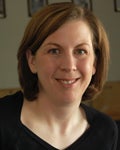With grant, thyroid cancer research gets fresh start
Thyroid cancer researchers at the University of Colorado Cancer Center have received a $900,000, two-year Challenge Grant from the National Institutes of Health to solve the widespread problem of contaminated thyroid cancer cell lines — live, growing cells used for research in labs around the world.
Bryan Haugen, M.D., head of the Division of Endocrinology and professor of medicine and pathology at the University of Colorado School of Medicine, is the grant's principal investigator. He and Rebecca Schweppe, Ph.D., assistant professor of medicine at the school, published a paper that described the problem. The grant will fund the creation of new validated thyroid cancer cell lines and the validation of existing cell lines.
The National Institutes of Health received approximately 21,000 Challenge Grant applications and will fund less than 3 percent of them with American Recovery and Rehabilitation Act stimulus money. ARRA Challenge Grants were developed to expedite the transfer of innovative, high-impact science from the laboratory to the clinic.
With the grant, Haugen and Schweppe will collaborate with two thyroid cancer researchers from Memorial Sloan-Kettering Cancer Center in New York: Jim Fagin, M.D., and Jeff Knauf, PhD.
"We'll be using parallel techniques to make the new cell lines, putting some cells from human tumors into mouse models to grow, and others into Petri dishes," Haugen said. "Some people have shown that the cells grown right from the beginning in animals look closer to the original tumor than those grown on plastic."
The researchers will do extensive analysis of the current and newly grown cell lines in order to develop a "thyroid cancer signature."
The new cell lines will be stored in a central repository to end issues of contamination caused by individual labs sharing cell lines with other researchers.



